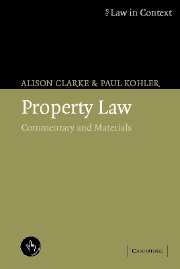Book contents
- Frontmatter
- Contents
- Preface
- Acknowledgments
- Table of cases
- Table of statutes
- Table of statutory instruments
- Table of treaties
- Table of EC legislation
- Part 1 The concept of property
- 1 Property law: the issues
- 2 What we mean by ‘property’
- 3 Justifications for property rights
- 4 Allocating property rights
- Part 2 The nature of proprietary interests
- Part 3 The acquisition and disposition of property interests
- Part 4 Proprietary relationships
- Bibliography
- Index
3 - Justifications for property rights
Published online by Cambridge University Press: 05 June 2012
- Frontmatter
- Contents
- Preface
- Acknowledgments
- Table of cases
- Table of statutes
- Table of statutory instruments
- Table of treaties
- Table of EC legislation
- Part 1 The concept of property
- 1 Property law: the issues
- 2 What we mean by ‘property’
- 3 Justifications for property rights
- 4 Allocating property rights
- Part 2 The nature of proprietary interests
- Part 3 The acquisition and disposition of property interests
- Part 4 Proprietary relationships
- Bibliography
- Index
Summary
Introduction: general and specific justifications
In Property Rights: Philosophic Foundations, Lawrence Becker draws a distinction between general justification for property rights (‘why should there ever be any property rights at all?’) and specific justification (‘what sorts of people should own what sorts of things and under what conditions?’).
In general, we consider general justification in this chapter and specific justification in Chapter 4. However, it is not possible to keep the two wholly separate. If you take an economist's view of property, the question of general justification is viewed as a question of the functions that property rights perform. This, however, quickly develops into arguments about what type of property ownership (private, communal or state ownership) best fulfils these functions. This inevitably dictates, to some extent at least, who should have what sorts of interest in what sorts of thing. We deal with both issues in section 3.2 of this chapter.
John Locke approaches the question of general justification from a different angle. In Private Ownership, James Grunebaum points out that property ‘rights’ necessarily entail exclusion, and in Chapter 2 we see that this is what marks limited access communal property and private property off from no-property and open access communal property. If no-property or open access communal property is reduced either to private ownership or to limited access communal property this necessarily results in a curtailment of everyone else's privilege or liberty to use that resource.
- Type
- Chapter
- Information
- Property LawCommentary and Materials, pp. 59 - 106Publisher: Cambridge University PressPrint publication year: 2005

